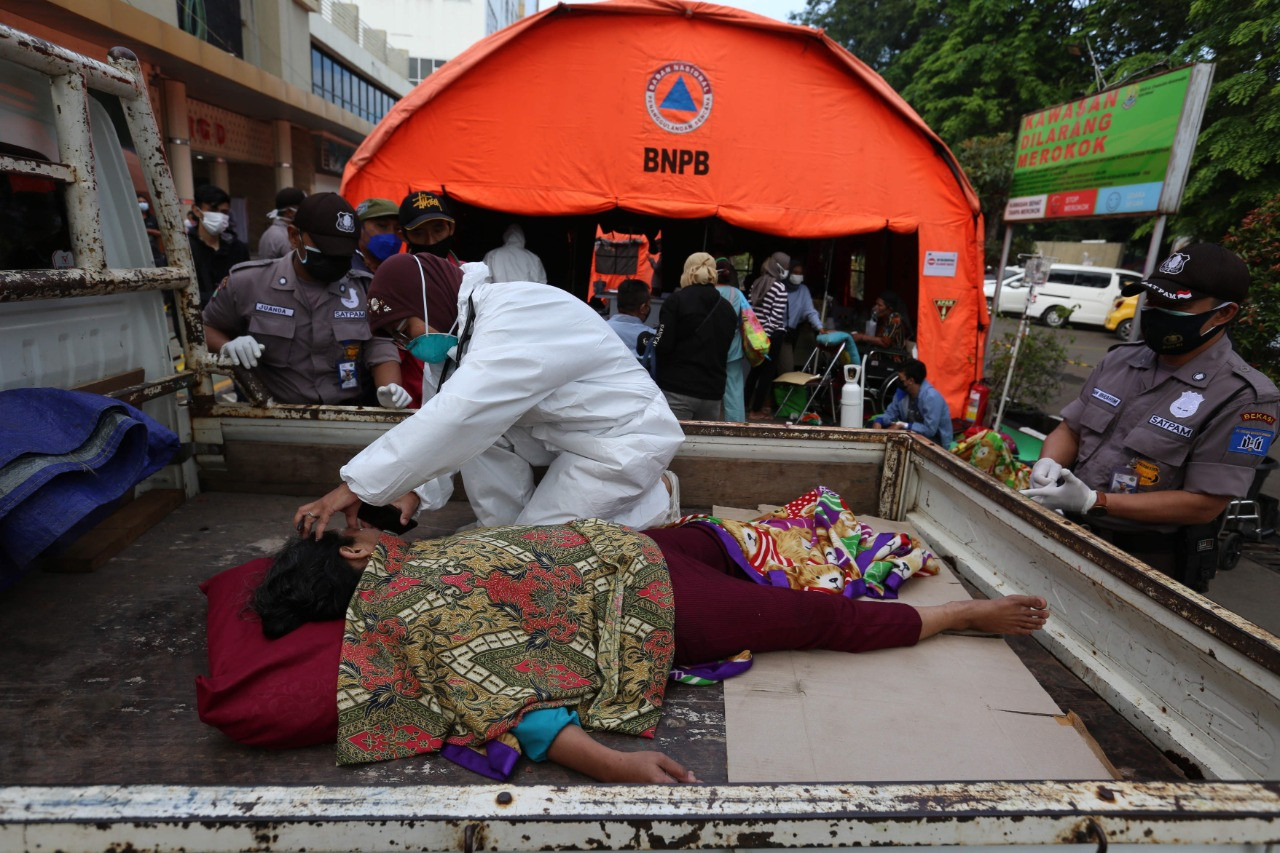Popular Reads
Top Results
Can't find what you're looking for?
View all search resultsPopular Reads
Top Results
Can't find what you're looking for?
View all search resultsRight to health for all
There is no denying that the health system is unprepared to deal with a pandemic of the current scale, and more pandemics are likely to strike in the future.
Change text size
Gift Premium Articles
to Anyone
 A nurse from Chasbullah Abdulmajid General Hospital in Bekasi, West Java, examines a suspected COVID-19 patient as she lies in the bed of a pickup truck on June 25. The patient's family used the truck to transport her to the hospital because no other vehicles were available. She had experienced breathing difficulties, vomiting and fatigue for days, her family said. (JP/PJ Leo)
A nurse from Chasbullah Abdulmajid General Hospital in Bekasi, West Java, examines a suspected COVID-19 patient as she lies in the bed of a pickup truck on June 25. The patient's family used the truck to transport her to the hospital because no other vehicles were available. She had experienced breathing difficulties, vomiting and fatigue for days, her family said. (JP/PJ Leo)
T
he steep rise in COVID-19 cases has pushed the nation’s healthcare system to the brink, as evinced by the long lines of patients waiting for treatment. As the bed occupancy rate stretches close to, if not beyond, the limit, emergency wards have been shifted to tents outside hospitals to create more room for COVID-19 beds.
The deluge of COVID-19 patients is expected to worsen in the coming two weeks, despite the stricter restrictions, which will be in force until July 20. Coordinating Maritime Affairs and Investment Minister Luhut Pandjaitan described the coming two weeks as a make or break moment in the government’s efforts to contain the raging pandemic.
With hospitals already overwhelmed and overburdened, self-isolation is mandatory for people with light or no symptoms. The National Disaster Mitigation Agency (BNPB) and the Jakarta administration have converted many buildings, including apartments, into health facilities for those required to self-quarantine, as the Athletes Village emergency hospital in Kemayoran, Central Jakarta, is fully occupied.
Nearly 1,900 patients now fill the three towers of the repurposed Nagrak low-cost apartment building in Cilincing, North Jakarta. This week, another low-cost apartment building in Pasar Rumput, South Jakarta, will be ready to accommodate patients who have to self-isolate.
Previously, Jakarta, which remains the epicenter of the outbreak, designated five city-owned hotels to accommodate self-isolating patients.
But it cannot afford to accept more patients with minor COVID-19 symptoms. They have no choice but to self-quarantine at home.
Healthcare guidelines state that only if self-quarantining patients develop respiratory problems should they go to the hospital for intensive care. Health Ministry spokeswoman Siti Nadia Tarmizi has insisted that medical facilities will be available for everyone if local governments are committed to ensuring that hospitals, whether region-owned or private, spare emergency beds for the patients.
However, an independent data initiative called LaporCOVID-19 has released data to support its argument that the country’s health system has “collapsed”. The group found at least 265 deaths outside of hospitals as the patients were self-isolating at home or waiting for emergency beds.
The data was collected from June to July 2, and the group said it could be just the tip of the iceberg, as many deaths among patients in self-quarantine could have gone unreported.
The deaths were reported in 47 regencies and municipalities in 10 provinces, namely Jakarta, Banten, West Java, Central Java, Yogyakarta, East Java, Lampung, Riau, Riau Islands and East Nusa Tenggara.
While the findings will need verification, the government cannot deny that the national health system needs significant improvements to ensure that the state fulfills the universal basic right to health. There is no denying that the health system is unprepared to deal with a pandemic of the current scale, and more pandemics are likely to strike in the future.
While access to hospitals remains limited among COVID-19 patients, the government has to handle those in self-quarantine with care. They need constant support, both medical and psychological, so that they can recover as soon as possible.









